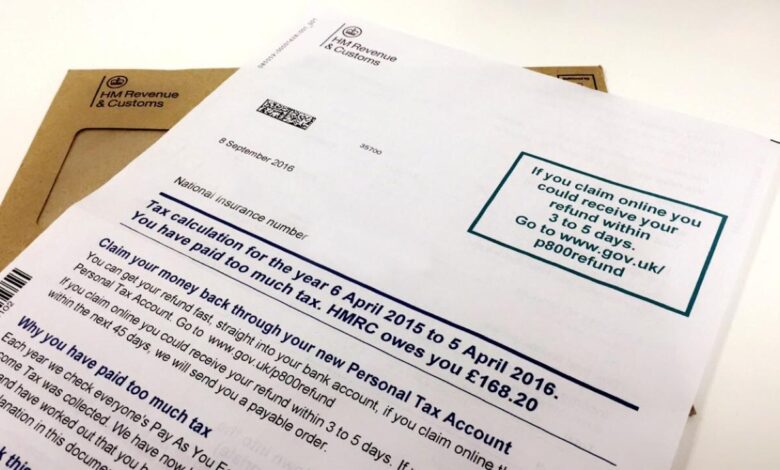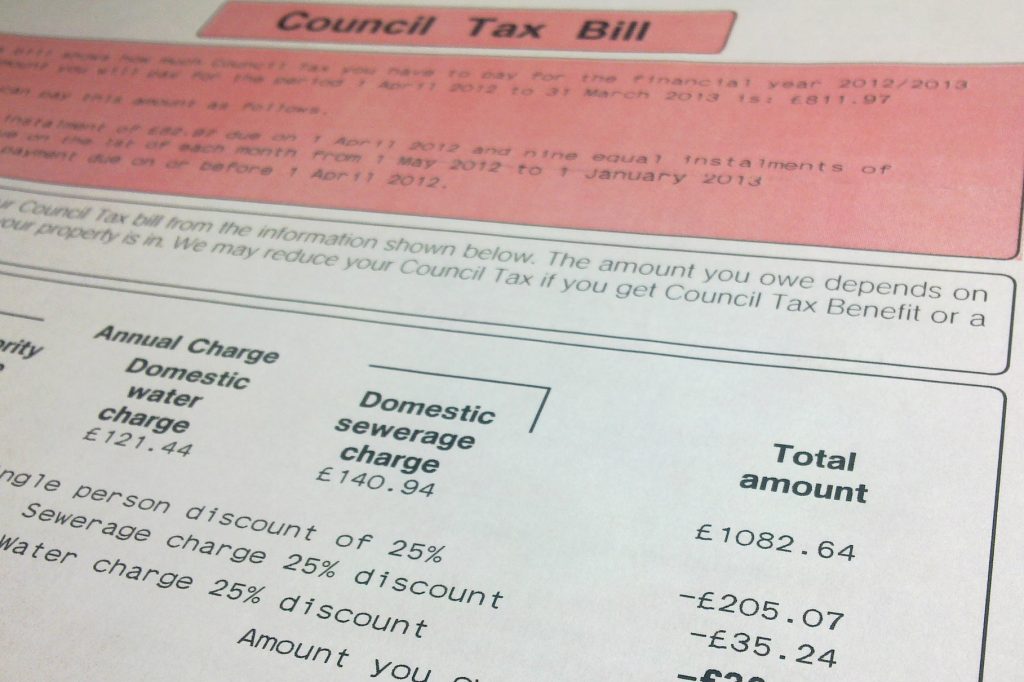
England Populace Should Know This Council Tax Rebate Cyber Scam
England populace should know this council tax rebate cyber scam – it’s happening right now! Slick criminals are using sophisticated phishing tactics to trick unsuspecting residents into handing over their personal and financial details. They’re mimicking official council communications, creating convincing fake emails and texts promising rebates. But don’t be fooled! This post will arm you with the knowledge to spot these scams and protect yourself from becoming a victim.
We’ll delve into the sneaky methods these scammers employ, from cleverly worded phishing emails to urgent text messages designed to pressure you into acting quickly. We’ll also explore how to identify the red flags, verify information through official channels, and report suspicious activity. Learning to protect yourself is crucial in today’s digital world, so let’s get started!
Understanding the Council Tax Rebate Scam
The recent council tax rebate scheme in England unfortunately attracted a wave of cybercriminals looking to exploit the situation and defraud unsuspecting residents. This scam leveraged the genuine government initiative to trick people into handing over their personal and financial details. Understanding the mechanics of these scams is crucial to protecting yourself.
Scam Mechanics and Deception Methods
The council tax rebate scam typically involves fraudulent emails, text messages, or phone calls pretending to be from local councils or government agencies. Scammers often create convincing-looking websites or use sophisticated phishing techniques to mimic official communication. They might claim that there’s an issue with your rebate application, a need for additional information, or an overpayment that needs to be rectified – all designed to lure you into clicking a link or providing sensitive data.
Information Acquisition Tactics
Scammers employ various methods to gain access to personal information. Phishing links in emails or texts lead to fake websites that look identical to legitimate council websites. These fake sites ask for details like your full name, address, National Insurance number, bank account details, and council tax reference number. Sometimes, scammers might use social engineering techniques, manipulating victims through phone calls or emails to elicit this information.
They might also try to exploit existing data breaches, combining publicly available information with their phishing attempts to increase their success rate.
Examples of Phishing Attempts, England populace should know this council tax rebate cyber scam
A typical phishing email might say something like: “Urgent: Action Required – Your Council Tax Rebate Application.” The email will contain a link to a fake website that closely resembles the genuine council website. A text message variant might read: “Your £150 Council Tax Rebate is ready. Claim now: [shortened suspicious link]”. These messages often create a sense of urgency to pressure victims into acting quickly without thinking critically.
Scam Variations and Characteristics
| Method | Phishing Technique | Target Audience | Red Flags |
|---|---|---|---|
| Email Phishing | Spoofed email address, fake website link, urgent tone | All residents expecting a rebate | Suspicious links, grammatical errors, unusual requests for personal information, lack of official branding |
| SMS Phishing (Smishing) | Shortened URL, sense of urgency, claim of immediate action needed | Residents who use mobile phones | Unexpected text messages, generic greetings, pressure to act quickly, suspicious links |
| Phone Phishing (Vishing) | Caller ID spoofing, convincing voice, requests for sensitive information | Residents of all ages | Unexpected calls, requests for personal details, aggressive tone, pressure to act immediately |
| Website Phishing | Near-perfect replica of a council website, requests for login credentials | Residents who search online for council information | Incorrect website address (URL), suspicious domain name, unusual design elements, request for unnecessary information |
Identifying Red Flags and Warning Signs

Council tax rebate scams are becoming increasingly sophisticated, making it crucial to be vigilant. Understanding the common tactics used by scammers can significantly reduce your risk of falling victim. This section will highlight key warning signs to look out for in emails, text messages, and phone calls claiming to offer a council tax rebate.These scams often rely on exploiting people’s trust and a desire for quick financial gains.
By learning to identify these red flags, you can protect yourself and your finances.
Suspicious Language and Requests
Scam communications frequently contain grammatical errors, typos, and overly informal language. They might use urgent or threatening language to pressure you into acting quickly. Examples include emails with poor spelling and grammar, unusual email addresses (@gmail.com instead of a council’s official domain), or requests for personal information such as bank details or passwords via email or text. Legitimate council communications will always be professional and use the correct official channels for communication.
Requests for immediate action, especially those involving the transfer of money, are a significant red flag. For instance, a message demanding payment to “unlock” your rebate or threatening legal action if you don’t respond immediately is highly suspicious.
Urgency Tactics Employed by Scammers
Scammers often use a sense of urgency to pressure victims into making quick decisions without thinking. This creates a sense of panic and prevents victims from verifying information independently. Common tactics include deadlines, threats of penalties, and claims of limited-time offers. For example, a message might claim that the rebate will be cancelled unless you act within 24 hours or that you will face a fine if you don’t provide your banking details immediately.
This pressure tactic is designed to bypass your critical thinking and encourage immediate action, often leading to financial loss.
Verifying Information Through Official Channels
Always verify any communication claiming to offer a council tax rebate through official channels. Never click on links in suspicious emails or text messages. Instead, visit your council’s official website or contact them directly using the phone number or email address listed on their website. Compare the information provided in the suspicious communication with the information on the council’s official website.
Discrepancies should raise serious concerns about the legitimacy of the communication. Remember, your council will never ask for your bank details or passwords via email or text.
Flowchart for Handling Suspicious Communications
The following flowchart illustrates the steps to take when you receive a suspicious communication claiming to offer a council tax rebate:Imagine a flowchart with these boxes and arrows:Box 1: Receive communication about council tax rebate.Arrow pointing right: Is the communication from a known and trusted source (e.g., official council email or website)?Arrow pointing down (yes): Proceed with caution, but verify information on official council website.Arrow pointing down (no): Proceed to Box 2.Box 2: Does the communication contain any red flags (e.g., poor grammar, urgent requests, requests for personal information)?Arrow pointing down (yes): Do not respond; report the communication to Action Fraud (or your local equivalent).Arrow pointing down (no): Proceed to Box 3.Box 3: Verify the information independently through official council channels (website, phone number).Arrow pointing down: Does the information match?Arrow pointing down (yes): Proceed with caution.Arrow pointing down (no): Do not respond; report the communication to Action Fraud (or your local equivalent).
Protecting Yourself from the Scam: England Populace Should Know This Council Tax Rebate Cyber Scam
The council tax rebate scam is a serious threat, but by taking proactive steps, you can significantly reduce your risk of becoming a victim. This involves understanding how scammers operate, securing your online presence, and knowing where to find reliable information. Remember, prevention is always better than cure.Protecting your personal information is paramount in the digital age. Scammers are constantly seeking vulnerabilities to exploit, so a multi-layered approach is crucial.
This includes strengthening your online security practices and exercising caution when interacting with unsolicited communications.
Strong Passwords and Multi-Factor Authentication
Strong passwords are the first line of defense against unauthorized access to your accounts. A strong password is long, complex, and unique to each account. Avoid using easily guessable information like birthdays or pet names. Instead, use a combination of uppercase and lowercase letters, numbers, and symbols. Consider using a password manager to generate and securely store complex passwords for all your online accounts.
Further enhancing your security, multi-factor authentication (MFA) adds an extra layer of protection by requiring a second form of verification, such as a code sent to your phone or email, in addition to your password. Enabling MFA on all your important accounts, including your online banking and email, is highly recommended. For example, if someone gains your password, they will still be blocked from accessing your account without the second verification code.
Recognizing and Avoiding Phishing Attempts
Phishing is a common tactic used by scammers to trick individuals into revealing sensitive information. Phishing emails or text messages often mimic legitimate organizations, such as your local council, attempting to lure you into clicking malicious links or providing personal details. Look for red flags such as grammatical errors, suspicious email addresses, urgent requests for information, and threats of penalties for non-compliance.
Never click on links or open attachments from unknown or untrusted senders. If you are unsure about the authenticity of a communication, contact the organization directly using their official contact details found on their website, rather than replying to the suspicious communication. For example, a genuine council tax email would likely come from a known and verifiable council email address, not a generic or free email service.
Reputable Sources for Verifying Council Tax Information
Always verify information received regarding council tax through official channels. Do not rely solely on emails or text messages. Instead, check your council’s official website for information about rebates and payment methods. You can also contact your council directly via phone or in person to confirm any information. Avoid searching for council tax information through unofficial websites or social media groups, as these may contain inaccurate or misleading information.
Examples of reputable sources include your local council’s website, the government’s website (e.g., GOV.UK), and your council’s official social media pages (if they have them and you’re sure of their authenticity). Always be wary of websites that claim to offer council tax assistance but ask for personal information upfront.
Reporting the Scam and Seeking Help
So, you’ve encountered a council tax rebate scam – what now? Don’t panic; taking swift action is key to protecting yourself and potentially helping prevent others from falling victim. Reporting the scam is crucial, not only for your personal recovery but also for the wider community. The authorities need this information to track down perpetrators and improve preventative measures.Reporting suspected scams is straightforward, and there are various avenues for doing so.
The key is to act quickly and accurately record all details.
Reporting to Action Fraud
Action Fraud is the UK’s national reporting centre for fraud and cybercrime. It’s the primary point of contact for reporting these types of incidents. You can report online via their website, providing as much detail as possible about the scam, including dates, times, communication methods (email, text, phone), and any financial losses incurred. They will log your report and may investigate further, depending on the circumstances.
Action Fraud’s website offers a detailed reporting form to ensure all relevant information is captured. Remember to keep any evidence, such as emails, text messages, and screenshots, for your records and to provide to Action Fraud if requested.
Seriously, folks in England need to be aware of that council tax rebate scam doing the rounds – it’s a nasty piece of work! Protecting yourself online is crucial, and understanding how cloud security works is a big part of that. Learning more about solutions like bitglass and the rise of cloud security posture management can help you understand the bigger picture of online safety.
So, stay vigilant about those scams, and stay informed about online security best practices!
Contacting the Police
In cases involving significant financial loss or if you feel threatened or harassed, contacting your local police force directly is also advisable. They can offer immediate support and advice, and may be able to launch a more immediate investigation, especially if the scam involved threats or intimidation.
Contact Information for Reporting Cybercrime in England
- Action Fraud: 0300 123 2040 or report online at www.actionfraud.police.uk
- Your Local Police Force: Contact details can be found on the Police.uk website.
Steps to Take if You’ve Fallen Victim
If you’ve already fallen victim to the council tax rebate scam, immediate action is vital to minimise further losses. This includes contacting your bank immediately to report the fraudulent transaction and potentially place a fraud alert on your account. You should also change your online banking passwords and any other passwords that may have been compromised. Gather all relevant documentation, including communication from the scammers, transaction details, and any personal information they may have obtained.
This information will be invaluable in reporting the crime and recovering any losses.
Support Available to Victims of Cybercrime
Victims of cybercrime are not alone. Numerous organisations offer support and guidance. Action Fraud itself provides links to resources and support services on their website. Citizens Advice can offer advice on financial recovery and dispute resolution. Victim Support provides emotional and practical support to victims of crime, including cybercrime.
They offer confidential help and can guide you through the process of reporting and recovering from the incident.
Actions to Take After Discovering a Scam Attempt
It’s important to have a clear plan of action if you suspect a scam. Here’s a list of steps to take:
- Do not respond to any further communication from the scammer.
- Report the scam to Action Fraud immediately.
- If you have suffered financial loss, contact your bank or financial institution immediately.
- Change your online passwords and security questions.
- Consider monitoring your credit report for any suspicious activity.
- Keep records of all communication and transactions related to the scam.
- Seek support from Citizens Advice or Victim Support if needed.
Public Awareness and Prevention

The council tax rebate scam is a serious threat, and preventing its spread requires a multi-pronged approach focusing on proactive public awareness and education. Effective communication is key to empowering citizens to identify and avoid these scams, protecting both their finances and their personal information. This involves a concerted effort from local councils, national government, and the media to disseminate clear, concise, and easily understandable information.Public awareness campaigns must be tailored to reach a broad spectrum of the population, accounting for varying levels of technological literacy and access to information.
The message needs to be simple, memorable, and easily shareable across different communication channels.
Strategies for Raising Public Awareness
A robust public awareness strategy should utilize multiple channels to maximize reach and impact. This includes utilizing traditional media such as television and radio advertisements, alongside digital platforms like social media, council websites, and email newsletters. Targeted advertising campaigns on social media platforms can reach specific demographics, ensuring the message resonates with the most vulnerable groups. Partnerships with community organizations and local businesses can further amplify the message and build trust.
Furthermore, educational workshops and community events can provide interactive learning opportunities, enabling direct engagement and question-and-answer sessions. Clear and concise information leaflets, available in multiple languages and formats (including large print and audio versions), should be distributed widely.
Public Service Announcement Design
Our PSA will be a short, impactful video lasting approximately 30 seconds. The visuals will open with a close-up shot of a suspicious email, highlighting phrases like “urgent,” “immediate action required,” and “council tax refund.” The email’s sender will be obscured, emphasizing the anonymity of scammers. The scene then shifts to a graphic depicting a person anxiously clicking a link, followed by a depiction of their bank account being emptied.
Seriously, folks in England, watch out for those council tax rebate scams! They’re relentless. Building secure systems to combat this kind of fraud is crucial, and that’s where advancements like those discussed in this article on domino app dev, the low-code and pro-code future , become incredibly important. Faster, more secure app development could help protect against these attacks; let’s stay vigilant against these council tax scams!
This transition underscores the immediate consequences of falling victim to the scam. The next scene shows a friendly, trustworthy-looking council employee reassuring the viewer that the council will never request personal information via email or unsolicited phone calls. The PSA concludes with the council’s website and phone number displayed prominently, accompanied by a clear call to action: “Don’t fall victim.
Report suspicious emails and calls immediately.” The overall tone will be serious but reassuring, aiming to inform without inducing unnecessary panic.
The Role of Local Councils
Local councils play a crucial role in protecting their residents from scams. They should proactively inform residents about ongoing scams through multiple channels, including their websites, social media, local newspapers, and community newsletters. Councils should provide clear, concise, and easily accessible information on how to identify and report scams. Regular updates on known scams and preventative measures should be provided.
They should also offer support and guidance to victims of scams, helping them navigate the reporting process and access any available assistance. Finally, councils should actively collaborate with other agencies and organizations to share information and coordinate efforts to combat scams.
Examples of Effective Communication Campaigns
The “Take Five to Stop Fraud” campaign in the UK provides a good example of a successful national campaign. It focuses on simple steps individuals can take to protect themselves from fraud, promoting a culture of vigilance and awareness. Another example is the “Think Before You Click” campaign, which emphasizes the importance of verifying the authenticity of emails and websites before clicking on links or providing personal information.
These campaigns use relatable scenarios and clear messaging to resonate with the public. Many local councils have also run successful targeted campaigns using social media, posters, and community events.
Comparing Approaches to Public Awareness Campaigns
Different approaches to public awareness campaigns have varying degrees of effectiveness. Direct mail campaigns, while potentially reaching a wide audience, can be expensive and may have low engagement rates. Digital campaigns, utilizing social media and targeted advertising, can be more cost-effective and reach specific demographics, but require expertise in digital marketing. Community-based approaches, such as workshops and events, offer high engagement but may have limited reach.
A multi-channel approach, combining various methods, is generally considered the most effective strategy for maximizing reach and impact. Measuring campaign effectiveness requires careful monitoring of key metrics such as website visits, social media engagement, and reported scams.
Epilogue

So, remember folks, don’t let these cybercriminals steal your hard-earned money! Stay vigilant, double-check any communication claiming to be from your council, and don’t hesitate to report suspicious activity. By staying informed and taking proactive steps, we can collectively combat this council tax rebate scam and protect our communities. Let’s spread the word and keep England safe from these online predators!
Frequently Asked Questions
What should I do if I think I’ve received a scam email?
Do NOT click any links. Forward the email to your council’s fraud department and then delete it. Report it to Action Fraud (the UK’s national reporting centre for fraud and cybercrime).
How can I verify a council tax rebate email?
Contact your local council directly using their official website or phone number found on their official website, never a link in an email.
What if I’ve already fallen victim to the scam?
Report it to Action Fraud immediately, contact your bank to report the fraudulent activity, and change all your online passwords.
Are there any resources to help me improve my online security?
Yes! The National Cyber Security Centre (NCSC) website offers plenty of free advice and guidance on protecting yourself online.





